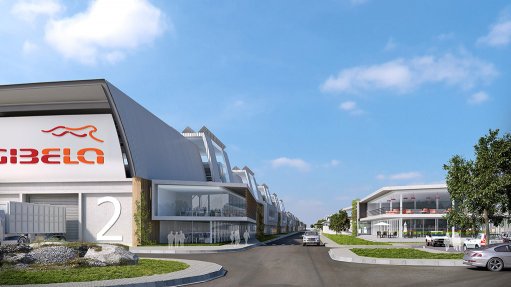
An artist's impression of the Gibela factory in Ekurhuleni
A feasibility study into the construction of the greenfield industrial complex and rail factory in Dunnottar, Ekurhuleni, which will house the Gibela Rail Transportation manufacturing plant, has been approved.
The 70 ha industrial park will include a 36 ha train assembly site, a 10 ha bogie, traction and motor site, and a 25 ha supplier park. The factory would produce 580 coaches and was expected to generate about 33 000 direct and indirect jobs.
During an Economic Sectors, Employment and Infrastructure Development Cluster (ESEID) media briefing on Wednesday, Transport Minister Dipuo Peters outlined that, at present, the Passenger Rail Agency of South Africa (PRASA) expected the first X'Trapolis Mega train, being manufactured in Brazil, to be delivered by end-November.
This formed part of the R51-billion contract for the delivery of 600 new trains over ten years. The first 20 trains were being manufactured at Alstom's Lapa facility, in Brazil, with the remainder to be manufactured in South Africa.
The majority shareholder in Gibela is Alstom Southern Africa, which holds 61%, with New Africa Rail holding 9% and Ubumbano Rail 30%.
AFRO 4000
Meanwhile, when asked about the progress being made in investigations into the suitability of the Afro 4000 locomotives, manufactured by Spanish firm Vossloh España, for use on South Africa’s rail network, the Minister said the Railway Safety Regulator (RSR) was still conducting tests.
PRASA had faced a media storm earlier this year, amid allegations that the Afro 4000 locomotives were too tall for South African infrastructure.
PRASA had ordered 20 diesel and 50 hybrid locomotives from Vossloh in a R3.5-billion deal.
PRASA has insisted that the trains did not exceed the height requirements, but the debacle had led to the removal of the former CEO Lucky Montana and the chief engineer on the project Daniel Mtimkulu.
“The RSR has given me an indication that, through the preliminary report on the investigations of the 20 locomotives that were supposed to have come, it is ready to inform PRASA and Transnet of its findings,” Peters stated.
She added that, upon completion, the RSR would move to costing calculations and determine if there would be any additional costs that need to be considered.